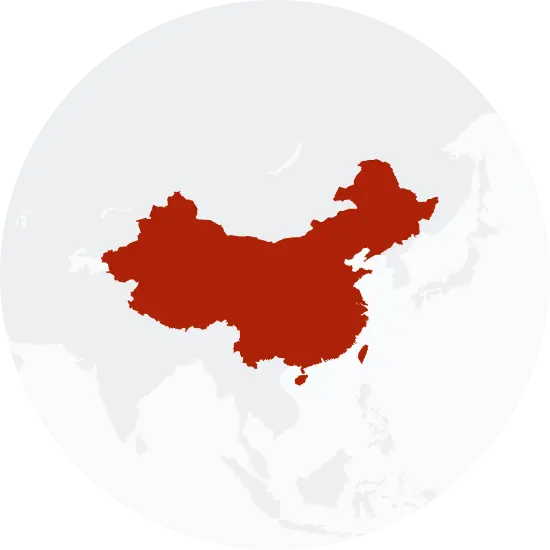Explore the Family Name Guan
How common is the last name Guan in the United States?
Based on the Decennial U.S. Census data, the popularity of the surname Guan has significantly increased between 2000 and 2010. In 2000, Guan was ranked 7,513th in popularity, however by 2010 it had risen to the 4,867th position, marking a notable change of 35.22 percent. The count of individuals with the surname also saw a significant increase, going from 4,087 in 2000 to 7,247 in 2010 - a rise of 77.32 percent. This resulted in the proportion of people named Guan per 100,000 increasing by 61.84 percent during the same period.
| 2000 | 2010 | Change | |
|---|---|---|---|
| Rank | #7,513 | #4,867 | 35.22% |
| Count | 4,087 | 7,247 | 77.32% |
| Proportion per 100k | 1.52 | 2.46 | 61.84% |
Race and Ethnicity of people with the last name Guan
Turning to ethnicity, the Decennial U.S. Census data shows that the majority of individuals with the surname Guan identify as Asian/Pacific Islander. This ethnic identity group saw an increase of 4.19 percent from 2000 to 2010, moving from 92.27 percent to 96.14 percent. During the same period, those identifying as White decreased by 51.34 percent, from 3.74 percent to 1.82 percent, and those identifying as Hispanic also saw a decrease of 19.05 percent. The percentage of Guans identifying with two or more races dropped notably by 59.84 percent. The data for Black, American Indian and Alaskan Native ethnicities were either zero or suppressed for privacy reasons.
| 2000 | 2010 | Change | |
|---|---|---|---|
| Asian/Pacific Islander | 92.27% | 96.14% | 4.19% |
| White | 3.74% | 1.82% | -51.34% |
| Hispanic | 1.47% | 1.19% | -19.05% |
| Two or More Races | 1.27% | 0.51% | -59.84% |
| Black | 0% | 0% | 0% |
| American Indian and Alaskan Native | 0% | 0% | 0% |
Guan ancestry composition
23andMe computes an ancestry breakdown for each customer. People may have ancestry from just one population or they may have ancestry from several populations. The most commonly-observed ancestry found in people with the surname Guan is Chinese, which comprises 85.3% of all ancestry found in people with the surname. The next two most common ancestries are Chinese Dai (4.7%) and Korean (3.1%). Additional ancestries include Manchurian & Mongolian, Vietnamese, Japanese, Spanish & Portuguese, and Ashkenazi Jewish.
Ready to learn more about your ancestry? Get the most comprehensive ancestry breakdown on the market by taking our DNA test. Shop 23andMe
| ANCESTRY BREAKDOWN | COMPOSITION |
|---|---|
| Chinese | 85.3% |
| Chinese Dai | 4.7% |
| Korean | 3.1% |
| Other | 6.8% |

Possible origins of the surname Guan
Your DNA provides clues about where your recent ancestors may have lived. Having many distant relatives in the same location suggests that you may all share common ancestry there. Locations with many distant relatives can also be places where people have migrated recently, such as large cities. If a large number of individuals who share your surname have distant relatives in a specific area, it could indicate a connection between your surname and that location, stemming from either recent ancestral ties or migration.
Based on 23andMe data, people with last name Guan have recent ancestry locations all within China.
| RECENT ANCESTRY Location | Percentage |
|---|---|
| Guangdong, China | 42.00% |
| Jiangsu, China | 42.00% |
| Shanghai, China | 41.40% |
| Zhejiang, China | 41.40% |
| Fujian, China | 41.40% |
What Guan haplogroups can tell you
Haplogroups are genetic population groups that share a common ancestor on either your paternal or maternal line. These paternal and maternal haplogroups shed light on your genetic ancestry and help tell the story of your family.
The top paternal haplogroup of people with the surname Guan is O-F1399, which is predominantly found among people with East Asian & Indigenous American ancestry. Haplogroup O-F1399 is descended from haplogroup O-M1359. Other common haplogroups include O-F18 and O-F8, which are predominantly found among people with East Asian & Indigenous American and East Asian & Indigenous American ancestry. Other surnames with similar common haplogroups are: Chan, Wu, Fung, Lu, Lee, Huang, Chang, Chen, Wang, Yao.
The most common maternal haplogroups of people with Guan surname are: A4, D4a, M7b. These most commonly trace back to individuals of East Asian & Indigenous American and European ancestry.
 Paternal Haplogroup Origins O-M1359
Paternal Haplogroup Origins O-M1359
Your paternal lineage may be linked to the Cham
One of the many populations harboring members of haplogroup O1b1a1a1a1 is the Cham ethnic group, a group of people who speak Austronesian languages in Mainland Southeast Asia. Austronesian languages make up a language family that is extremely large and widespread, comprising over 350 million people on islands such as Madagascar, Easter Island, and many others. However, Austronesian languages are less common on mainland Asia, with a notable exception being the Chamic language. Research suggests that ancestors of the Cham people migrated from Southeast Asian islands to the mainland around the year 500 BCE, and that early Cham populations quickly began mixing with indigenous southern Vietnamese populations. As a result, the Chamic language now has words that were borrowed from languages spoken by indigenous Vietnamese people. It is likely that an ancestral Kinh population was one of the populations that mixed with the Cham people shortly after their migration to mainland Asia.
Your maternal lineage may be linked to the ancient people of the Indian subcontinent
While Haplogroup M is widespread throughout South and East Asia, it is more diverse on the Indian sub-continent than anywhere else in the world. The high degree of diversity of M in India is likely tied to its ancient arrival here nearly 50,000 years ago. In addition to M2, which is found throughout the subcontinent, there are dozens of haplogroups branching off of M that exist in India. These branches are often connected to specific regions, tribes, or ethnic groups. For example, haplogroup M18 is found among the Oraon peoples of eastern India and Bangladesh, while haplogroup M41 is common among the Pardhan speakers of eastern India, and haplogroup M31a can be found on the Andaman Islands, just off the southeast coast of India.

What do people with the surname Guan have in common?
Spoiler alert: it's complicated. People with the same last name are usually no more genetically similar than a randomly sampled group of people from the same population. That said, people with the same surname are more likely to have similar ancestries than randomly sampled individuals. The reason is the tendency of people with similar cultural or geographical backgrounds to preferentially mate with one another. That's why people who share a surname may be more likely to share traits and tendencies in common than people within the general population. Check out the percentages below to see the prevalences of tastes, habits, and traits of people with your surname compared with prevalences among 23andMe users.
Preferences
Traits

Cheek Dimples
Small indentations that appear on the cheeks when a person smiles.
"Guan" Surname 33.3%
23andMe Users 37.6%
Habits
Are health conditions linked to the last name Guan?
The short answer is that, if there is an association between surname and health, it's usually more about your ancestry than your name. Individuals with a given surname are no more genetically similar than the general population but often have similar ancestries. The populations of people associated with those shared ancestries often have sets of genetic variations, also known as alleles, in common. Some of those alleles are associated with a greater likelihood of developing certain diseases.
Disease variant frequency by ancestry
Disease allele frequencies in populations associated with the surname Guan are shown below. Important Note: not everyone with a disease allele will develop these health condition





